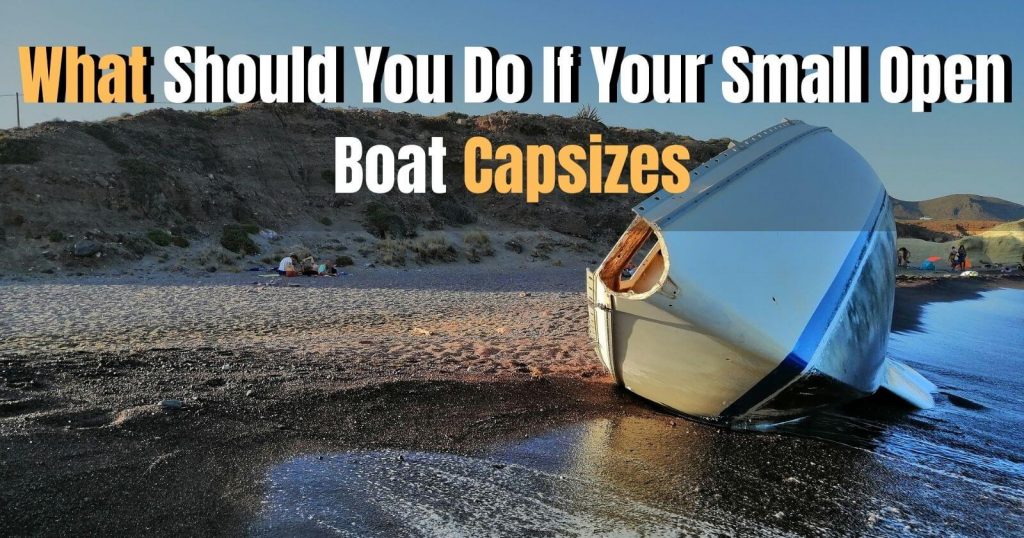
Your boat capsizes and floats away what should you do: Visitors want to keep calm since it will assist keep your passengers safe and peaceful. I’ve compiled a list of things you should do if you end up in the water without your boat. So let’s get right to it.
what should you do if your boat capsizes?
- First of all and importantly, do not be panicked.
- Make sure everyone is wearing a lifejacket and that all straps are properly attached. If you aren’t wearing a PFD (Personal Flotation Device), get one and put it on. If you don’t have time to put it on, grab it tightly.
- Never attempt to swim yourself to safety.
- Look around for any loose floating objects if you or anyone else is not wearing a life jacket.
- Start swimming in water if you don’t have any floating accessories.
Your boat capsizes and floats. Being prepared is important.
While no one wants to imagine that anything horrible will happen, it should never stop you from thinking about it and taking preparations. The best approach to be prepared is to always have the minimum amount of safety equipment on board your boat as specified by your region.
Removable seat covers and other buoyant multipurpose objects may be included in such floatation systems. Another thing to double-check is that you have enough life jackets on board. This includes both those required for children to wear at all times and those required for adults to wear as well. These floating devices will surely come in handy if your boat capsizes and floats away due to a circumstance.
According to a comprehensive survey conducted by USCG boating.org, the number of adults wearing a PFD or life jacket has climbed by 44 percent since 2006.
Please read our Self-Inflating Life Jacket Buying Guide.

During your journey if your boat capsizes and begins to float away,
If the terrible scenario occurs and your boat capsizes and is carried away by the current. There are numerous things you must do right now to guarantee that you and your passengers return to land safely.
Weather Check during Your Journey
Before leaving the marina, always check the local weather prediction and water conditions.
During your journey Weather changes should be monitored.
Throughout your trip, keep an eye on the weather – keep the boat radio tuned to the marine channel so you can check for small craft advisories. These alerts will be broadcasted instantly.
Please double-check your secure anchor before starting on your journey.
Check that your boat anchor is properly attached to the front of the boat – All boats should always have a properly weighted anchor on board, coupled to a strong enough anchor line. Never anchor the boat at the stern, as this may cause it to become flooded.
Make no abrupt changes.
Take turns slowly – Being the pilot of your boat, you must be mindful of the wave conditions and ensure that you do not take turns too quickly or cut them short. This has the potential to tip the boat over.
Passengers should not be allowed to lean over the side.
Allow passengers to not lean over the side of the boat. Vary according to the size of your boat; it might easily be tipped over if one of your passengers leans too far over the side.
Throughout your adventure Look for any leaks.
Check for leaks before leaving the dock – It is critical to prevent any water from entering the boat. So, before leaving the boat launch or pier, double-check that there are no obvious leaks.
If Your Pleasure Craft Sinks or Floats Away
Don’t be alarmed if your pleasure ship sinks or floats away. If you’re wearing a lifejacket or PFD, make sure it’s firmly attached, be calm, and wait for assistance. Swimming to shore should only be done as a last resort.
If you aren’t wearing a lifejacket or PFD, search for one floating in the water or other floating goods (coolers, oars or paddles, decoys, etc.) to assist you stay afloat. Make every effort to assist your passengers in finding something that will keep them afloat and together. You may have to tread water or float if you don’t have something to grab on to. To avoid hypothermia in cold water, float rather than tread.
What is the most likely reason of a person falling overboard?
- Loss of balance – It is critical that all passengers remain seated while the boat is moving. If you must move, stay as low as possible and keep your hands and feet in contact with the boat. High velocity in tiny boats can quickly result in and capsize.
- Taking turns too sharply – It is critical to always take corners as slowly as possible so that there is no jerking motion. To prevent tipping the boat too abruptly, take the turns in a wide sweeping manner.
- Never ride another boat’s wake sideways – Be aware that other boats on the water may produce an unexpected wake. Never approach the wake from the side.
In only one year, 113 persons were killed in watercraft accidents induced by drinking. Don’t become another statistic; don’t put yourself or anyone on board in danger by drinking.
People’s lives are saved by life jackets. There are several things that may go wrong with a boat and result in a boating disaster; of course, the best course of action is protection.
Always keep in mind that the Coast Guard and the Police/Water Sheriff’s Patrol are your safety net, depending on where you are boating. If you are out on the open ocean and have a problem, immediately turn on the boat’s radio and request assistance.
If you are on a local lake, you will most likely need to contact the county sheriff for the region you are in for assistance.
If Your Boat Sinks or Floats Away
- Don’t be worried if your boat sinks or floats away.
- Whether you’re using a personal floatation device, make sure it’s attached properly, be cool, and wait for assistance.
- Whenever you don’t have a personal floatation device, seek for one floating in the water or other floating things (coolers, oars or paddles, decoys, etc.) to assist you in staying afloat. Take the opportunity to assist your travelers in finding a way to keep them together and afloat.
- You may have to tread water or float if there is nothing to keep you up. Float rather than walk in frigid water to avoid hypothermia.
Conclusion
First of all and importantly, do not be panicked, if Your boat capsizes and floats away what should you do in that time. kindly follow all the safety measures and some more precautions, what should you do if your boat capsizes? Read our article and get all safety precautions.






